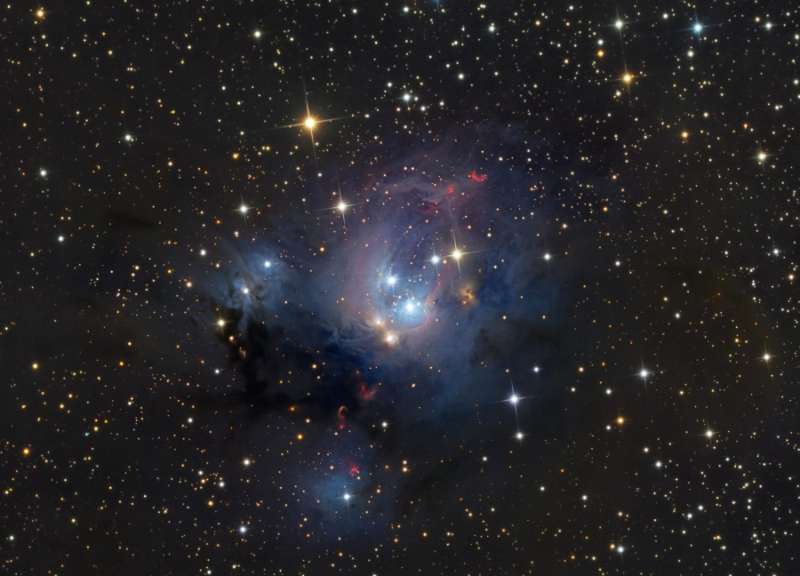Credit & Copyright: Johannes Schedler
(Panther Observatory)
Explanation:
Young suns still lie
within dusty NGC 7129, some
3,000 light-years away toward the royal
constellation
Cepheus.
While these stars
are at a relatively tender age, only a few million years old, it is
likely that our own Sun formed in a similar stellar nursery some
five billion years ago.
Most noticeable in
the sharp image are the
lovely bluish dust clouds
that reflect the youthful starlight.
But the compact, deep red crescent shapes are also markers
of energetic, young stellar objects.
Known as
Herbig-Haro
objects, their shape and color is
characteristic of glowing hydrogen gas
shocked by
jets streaming away from newborn stars.
Paler, extended filaments of
redish emission
mingling with the bluish
clouds are caused by dust grains effectively converting the
invisible ultraviolet starlight to visible red light through
photoluminesence.
Ultimately the natal gas and dust in the region
will be dispersed, the
stars
drifting apart as the loose
cluster orbits the center of the Galaxy.
At the estimated distance of
NGC 7129, this telescopic view spans
about 40 light-years.
1999 2000 2001 2002 2003 2004 2005 2006 2007 2008 2009 2010 2011 2012 2013 2014 2015 2016 2017 2018 2019 2020 2021 2022 2023 2024 2025 2026 |
Yanvar' Fevral' Mart Aprel' Mai Iyun' Iyul' Avgust Sentyabr' Oktyabr' Noyabr' Dekabr' |
NASA Web Site Statements, Warnings, and Disclaimers
NASA Official: Jay Norris. Specific rights apply.
A service of: LHEA at NASA / GSFC
& Michigan Tech. U.
|
Publikacii s klyuchevymi slovami:
star formation - zvezdoobrazovanie - Ob'ekt Herbiga-Aro
Publikacii so slovami: star formation - zvezdoobrazovanie - Ob'ekt Herbiga-Aro | |
Sm. takzhe:
Vse publikacii na tu zhe temu >> | |
